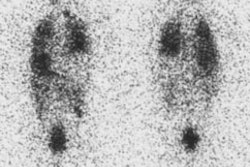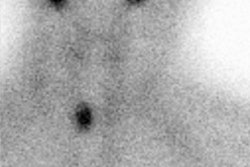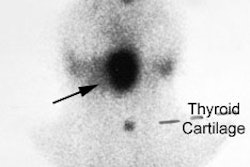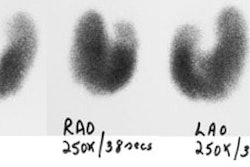Eur J Nucl Med 2001 Feb;28(2):198-202
Efficacy of high therapeutic doses of iodine-131 in patients with
differentiated thyroid cancer and detectable serum thyroglobulin.
de Keizer B, Koppeschaar HP, Zelissen PM, Lips CJ, van Rijk PP, van Dijk A, de
Klerk JM.
Serum thyroglobulin (Tg) is usually the best marker of residual or metastatic
disease after treatment of differentiated thyroid cancer. We evaluated the
effect of so-called blind therapeutic doses of iodine-131 in patients with
detectable Tg during suppressive levothyroxine treatment (Tg-on), and in
patients with a negative diagnostic scintigram but detectable Tg during the
hypothyroid phase (Tg-off). Twenty-two patients with differentiated thyroid
carcinoma underwent total thyroidectomy and radioiodine ablation. During the
follow-up, six patients with detectable Tg-on and 16 patients with detectable Tg-off
were identified. All patients were treated with a blind therapeutic dose of
7,400 MBq iodine-131. Diagnostic scintigrams were compared with post-treatment
scintigrams. Tg-off was measured in 16 cases, 1 year after the administration of
the blind therapeutic dose, at the time of the follow-up diagnostic scintigram.
Six patients were followed up by Tg-on only. Post-therapy scintigrams revealed
previously undiagnosed local recurrence or distant metastases in 13/22 cases
(59%); the remaining nine post-therapy scintigrams were negative. At the time of
the blind therapeutic doses, Tg-off values ranged from 8 to 608 microg/l. After
1 year of follow-up, Tg-off decreased in 14/16 (88%) patients. In all patients
who were followed by Tg-on only (n=6), a decrease in Tg values was measured. It
is concluded that blind therapeutic doses resulted in a decrease in Tg levels in
the majority of patients with suspected recurrence or metastases. The
post-treatment scintigrams revealed pathological uptake in 59% of patients.



